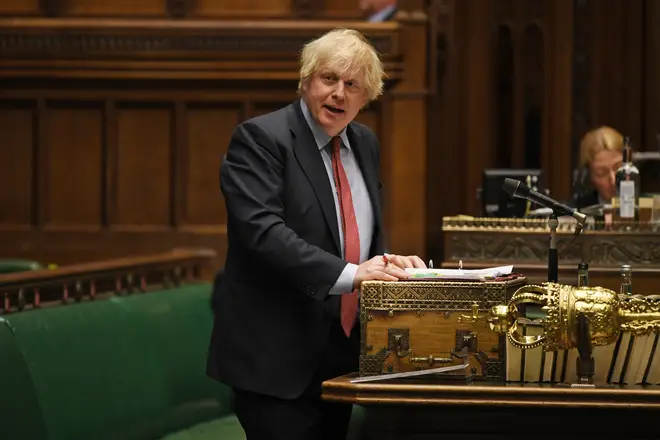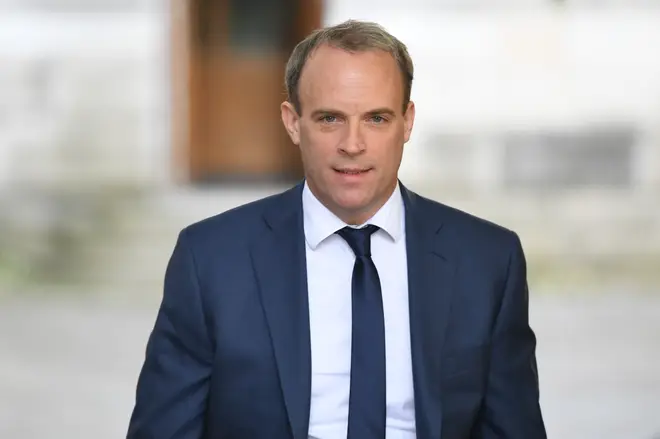
Tom Swarbrick 4pm - 6pm
16 June 2020, 13:53

PM announces the Foreign Office and International Development Department will be merged into a new department
Boris Johnson has announced that the Department for International Development and the Foreign and Commonwealth Office are to be merged into one department called the Foreign, Commonwealth and Development Office.
The Prime Minister announced the merger during a statement today in the House of Commons on "global Britain".
It means the Foreign Secretary, Dominic Raab, has been handed direct control of the UK's £14 billion aid budget.
International Development secretary Anne Marie Trevelyan is said to be lined up for a new role Minister of State in the Foreign Office once the merger takes place.
The Prime Minister also told MPs that the plans will give the UK a single voice on the world stage after Brexit.
He also told the Financial Times in January 2019 that the two departments should be rolled into one.
Boris Johnson said the UK possesses the third biggest aid budget and diplomatic network in the world, telling MPs: "We owe it to our people to make best use of these assets, which scarcely any of our peers can match.
"The British taxpayer has a right to expect that we will achieve the maximum value for every pound that we spend.
"One cardinal lesson of the pandemic is that distinctions between diplomacy and overseas development are artificial and outdated."

He also said the UK will need to work alongside allies to strengthen international bodies, such as the World Health Organisation, to help other countries improve their health systems.
He told the Commons: "It makes no sense to ask whether this amounts to aid or foreign policy.
"They're one and the same endeavour and they're designed to achieve the same goals - which are right in themselves and serve our national interest."
The Prime Minister said the time is right to merge the Foreign Office and Dfid now as coronavirus has already imposed "fundamental changes".
Mr Johnson said: "The Foreign Secretary will be in power to decide which countries receive or cease to receive British aid while delivering a single UK strategy for each country overseen by the National Security Council which I chair."
He added: "Now, amid this pandemic this House may ask whether this is the right moment to reorganise Whitehall, but I must say that in reality this crisis has already imposed fundamental changes on the way that we operate.
"If there is one further lesson it is that a whole-of-Government approach getting maximum value for the British taxpayer is just as important abroad as it is at home.
"So, this is exactly the moment when we most mobilise every one of our national assets including our aid budget and expertise to safeguard British interests and values overseas.
"The best possible instrument for doing that will be a new department charged with using all tools of British influence to seize the opportunities ahead."

In response, Sir Keir Starmer said the UK cannot play a leading role in the world by abolishing Dfid.
He said: "I passionately believe in Britain, I am proud of this country, I want to see it playing a leading global role again, a role we frankly haven't played in the last decade.
"I want to see Britain as a moral force for good in the world, a force for global justice and co-operation, leading the world on global security, leading the global search for a vaccine, leading the fight against poverty, climate change and gender inequality.
"We don't achieve that by abolishing one of the best performing and important departments."
Former Prime Minister David Cameron tweeted: "The Prime Minister is right to maintain the commitment to 0.7 - it saves lives, promotes a safer world and builds British influence. But the decision to merge the departments is a mistake."
"More could and should be done to co-ordinate aid and foreign policy, including through the National Security Council, but the end of DFID will mean less expertise, less voice for development at the top table and ultimately less respect for the UK overseas."
Former Labour Prime Ministers Gordon Brown and Tony Blair also commented on the decision.
In a tweet, Gordon Brown said: "DFID has lifted millions of people out of poverty, saved millions of lives, and helped millions more children go to school. It's sad the government is abolishing one of the UK's great international assets."
Tony Blair said in a set of tweets: “I am utterly dismayed by the decision to abolish DFID. We created DFID in 1997 to play a strong, important role in projecting British soft power. It has done so to general global acclaim.
"It is a leader in both programmes and thought in development, helping millions of the world’s most vulnerable to be relieved of poverty and killer diseases.
"The strategic aims of alignment with diplomacy and focus on new areas of strategic interest to Britain could be accomplished without its abolition. Wrong and regressive move.”
The Prime Minister is right to maintain the commitment to 0.7 - it saves lives, promotes a safer world and builds British influence. But the decision to merge the departments is a mistake. 1/2
— David Cameron (@David_Cameron) June 16, 2020
.@DFID_UK has lifted millions of people out of poverty, saved millions of lives, and helped millions more children go to school. It's sad the government is abolishing one of the UK's great international assets ~ GB https://t.co/rVXnhuKjc1
— Gordon & Sarah Brown (@OfficeGSBrown) June 16, 2020
Tony Blair: “I am utterly dismayed by the decision to abolish DFID. We created DFID in 1997 to play a strong, important role in projecting British soft power. It has done so to general global acclaim. (1/3)
— Tony Blair Institute (@InstituteGC) June 16, 2020
Following the statement, Sarah Champion, chair of the Commons DfID committee said: “It is outrageous that after the Government gave assurances that its Integrated Review will be done in a proper fashion, with proper consultation, that the FCO has made a land grab for DFID.“
Shadow foreign secretary Lisa Nandy tweeted: "Extraordinary that in the middle of a global crisis, the UK is retreating from the world. Aid has long been one of Britain's strengths helping us to build strong alliances, act as a moral force and creating greater global security. Once again we are diminished in the world."
The government confirmed there will no redundancies as a result of the merger. The DFID office in Scotland will also stay open.
The move has been long-proposed in Tory circles, with many thinking that the merger would happen in Boris Johnson's post-election cabinet reshuffle.
This did not happen, however a combined group was formed between junior ministers working across the two departments.
It follows an ongoing review by cross bench peer Lord Paul Bew into the government’s global aid spending, which is currently set at 0.7 per cent of annual GDP.
In relation to this, Mr Johnson told the Commons: "This will unite our aid with our diplomacy and bring them together in our international effort."
Earlier, Mr Johnson said the Government remains committed to spending 0.7% of GDP on aid.
He said: "Those well-intentioned decisions of 23 years ago were right for their time.
"They paved the way for Britain to meet the UN target of 0.7% of national income on aid, a goal that was achieved by the coalition government in 2013 and has been maintained... ever since.
"Including this year and it remains our commitment."
Extraordinary that in the middle of a global crisis, the UK is retreating from the world. Aid has long been one of Britain’s strengths helping us to build strong alliances, act as a moral force and creating greater global security. Once again we are diminished in the world https://t.co/vh5zrIUqJV
— Lisa Nandy (@lisanandy) June 16, 2020
Prior to the announcement, many political figures expressed their concerns over the merger.
Former international development secretary Rory Stewart has said he would be arguing "strongly" against a merger of his former departments if he was still in Cabinet.
His comments follow reports the Prime Minister is preparing to announce that the Department for International Development (Dfid) will be merged with the Foreign and Commonwealth Office.
Asked whether he would have argued against any merger, ex-Tory leadership candidate Mr Stewart said: "Yes, strongly."
The former Foreign Office minister added: "I don't think it is the smart option.
"There are many other things we need to be concentrating on at the moment.
"It will lead to a lot of disruption, a lot of uncertainty at a time when the Foreign Office has an enormous amount of be focused on."
Douglas Alexander, who served as international development secretary under Gordon Brown, said getting rid of Dfid would be "an act of national self-harm".
The ex-Labour MP, who was in post between 2007-10, tweeted: "Abolishing DfID would be an act of national self-harm that would hurt both the UK's global standing and our efforts to assist the world's poorest people amidst a global pandemic."
Tory MP Andrew Mitchell, who served as international development secretary during the coalition government, said closing Dfid would be a "quite extraordinary mistake".
In a statement, the former Cabinet minister said: "Abolishing Dfid would be a quite extraordinary mistake.
"First, it would destroy one of the most effective and respected engines of international development anywhere in the world.
"Second, many of the senior figures who are key to Britain's role as a development superpower will likely leave and go elsewhere in the international system - at a stroke destroying a key aspect of global Britain.
"Third, it is completely unnecessary as the Prime Minister exercises full control over Dfid's strategy and priorities through the National Security Council."